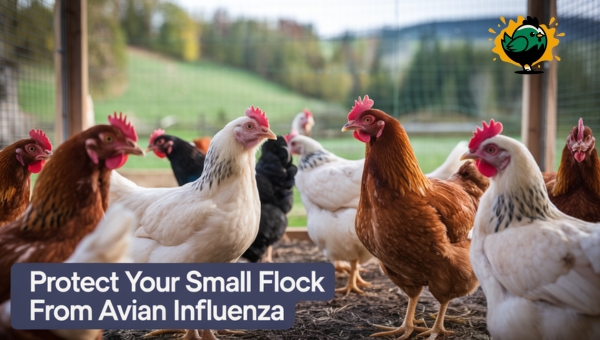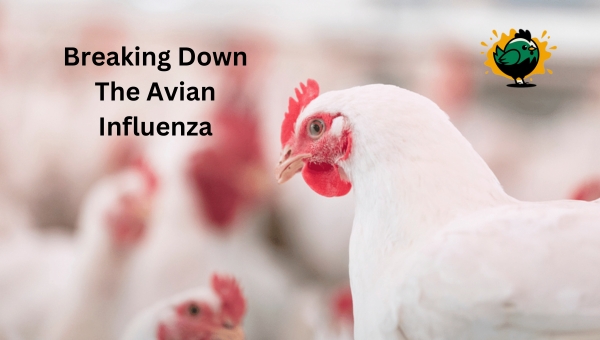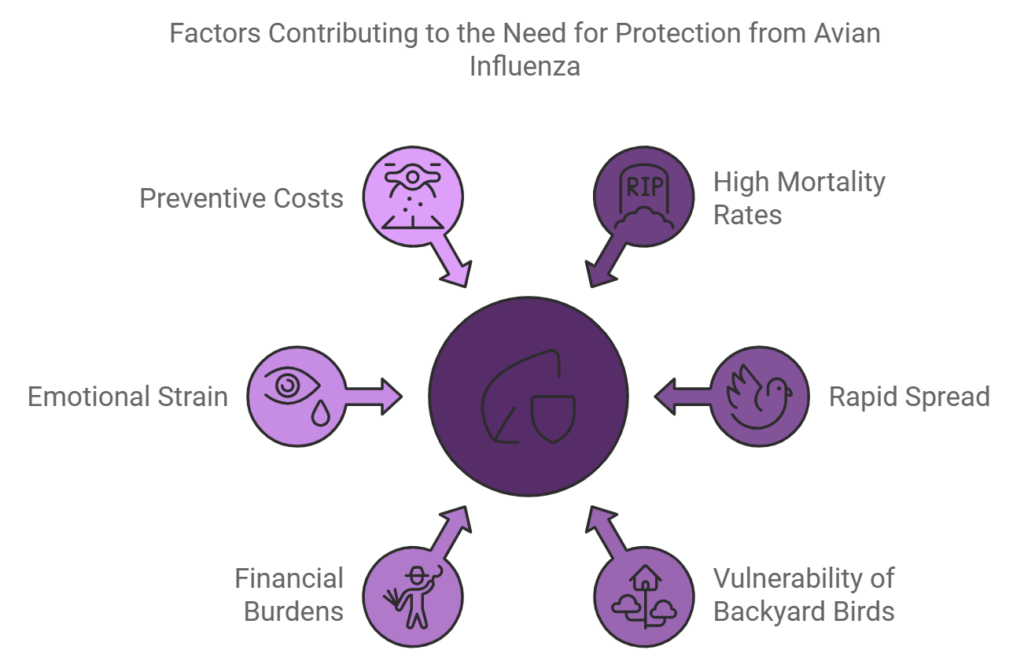Protect Your Small Flock from Avian Influenza – Safe Tips

Can you picture your backyard hens looking drowsy and ill when you wake up to their soft clucks? This scenario, unfortunately, is all too real for many small flock owners who face the threat of avian influenza. This contagious virus doesn’t just impact large commercial farms; it poses a significant risk to small flocks as well.
Understanding how to protect your small flock from avian influenza is crucial to ensure their health and your peace of mind. In this guide, we’ll explore vital tips and strategies to safeguard your feathered friends from this formidable disease. Stay informed and keep your flock safe from avian flu threats.
Breaking Down The Avian Influenza
Avian influenza, often referred to as bird flu, is a contagious viral infection that primarily impacts birds. This disease can be severe for poultry and even pose risks to humans and other animals.

Recognizing and understanding how avian influenza spreads and the symptoms it presents in birds are crucial steps in safeguarding your small flock.
Delving into the causes and transmission methods provides insight into how to effectively limit exposure. Additionally, identifying common symptoms allows for early detection and response, minimizing potential outbreaks.
Causes and Transmission
Avian influenza can spread through several pathways, including:
- Direct Contact: Birds can contract the virus through direct contact with infected birds, which shed the virus in their saliva, feces, and nasal secretions.
- Contaminated Environments: The virus can persist on surfaces and objects contaminated by infected birds, posing a risk to others.
- Airborne Particles: Infected droplets can become airborne, allowing the virus to travel through the air and infect other birds.
- Wild Birds: Migratory waterfowl can carry low pathogenic strains, which have the potential to mutate into more harmful forms.
Common Symptoms
When birds are affected by avian influenza, they may exhibit a variety of symptoms, such as:
- Respiratory Distress: This includes signs like coughing, sneezing, and nasal discharge.
- Neurological Signs: Birds may display tremors or a lack of coordination.
- Decreased Egg Production: Affected birds might lay fewer eggs or stop laying altogether.
- Swelling: Particularly noticeable around the head, neck, and eyes.
Understanding avian influenza and recognizing its signs are key components in maintaining the health of your flock. Implementing preventative measures based on this knowledge can help protect your birds from the severe impacts of this disease.
Importance of Protection
Protecting your small flock from avian influenza is crucial to maintaining their health and ensuring the sustainability of your poultry operation.

By understanding the potential impacts of this disease, you can take proactive steps to safeguard your birds. Let’s delve into how avian influenza affects small flocks and the economic and emotional consequences it brings to bird owners and farmers.
Impact on Small Flocks
- High Mortality Rates: Avian influenza can lead to significant losses in small poultry flocks, as the disease often results in high mortality rates among infected birds.
- Rapid Spread: The virus can quickly spread through a flock, affecting numerous birds in a short period.
- Backyard Birds: Small, non-commercial flocks, like those kept in backyards, are particularly vulnerable due to less stringent biosecurity measures.
Economic and Emotional Consequences
- Financial Burden: Outbreaks can impose heavy financial burdens on farmers due to costs associated with culling infected birds and replacing lost stock.
- Emotional Strain: The emotional impact on bird owners can be profound, as they may experience distress from witnessing the illness and loss of their animals.
- Preventive Costs: Implementing biosecurity measures and maintaining vaccinations can also add to the financial responsibilities of keeping a healthy flock.
By prioritizing protection and understanding these impacts, bird owners can make informed decisions to mitigate the risks associated with avian influenza.
Preventive Measures
Keeping your small flock safe from avian influenza requires a proactive approach. Implementing preventive strategies can help minimize the risk of a potential outbreak.

By focusing on effective biosecurity practices and staying up-to-date with vaccination and health monitoring, you can safeguard your birds and ensure their well-being.
Biosecurity Practices
Implementing biosecurity measures is a cornerstone in preventing avian influenza outbreaks. Here are essential practices to consider:
- Restrict Access: Limit entry to your poultry areas, allowing only essential personnel to minimize potential contamination.
- Sanitize Regularly: Clean and disinfect all equipment and vehicles involved in poultry care to reduce the risk of virus transmission.
- Control Wild Bird Exposure: Use physical barriers like nets to prevent contact between your flock and wild birds, who may carry the virus.
Vaccination and Health Monitoring
Vaccination and regular health checks are vital components in controlling avian influenza:
- Routine Health Checks: Regularly observe your flock for any signs of illness, ensuring early detection and intervention.
- Vaccination Programs: Consult with a veterinarian to establish a vaccination schedule tailored to your flock’s needs, providing an added layer of protection against the virus.
By adhering to these measures, you contribute significantly to the health and safety of your small flock.
Also Read: Fighting Chicks | Causes and How to Stop Aggression?
Early Detection and Response
When it comes to safeguarding your flock from avian influenza, timely recognition and prompt action are key.
By understanding the signs of infection and knowing the immediate steps to take, you can minimize the impact on your birds. Let’s explore how to identify potential infections and the actions required if you suspect avian influenza.
Recognizing Signs of Infection
Look out for these signs that may indicate avian influenza in your birds:
- A sudden increase in bird mortality: Unexpected deaths in the flock can be a red flag.
- A significant drop in egg production: A noticeable reduction in the number of eggs.
- Unusual behavior: Birds may appear lethargic or unresponsive.
- Respiratory issues: Watch for coughing, sneezing, or nasal discharge.
- Swelling around the head and eyes: This can be a physical sign of infection.
Steps to Take if Infection is Suspected
If you suspect avian influenza in your flock, follow these steps:
- Isolate-affected birds: Immediately separate sick birds from the healthy ones to prevent further spread.
- Contact local authorities: Notify animal health officials for guidance and testing.
- Enhance biosecurity measures: Increase cleaning and sanitation efforts within your poultry area.
- Limit access to your flock: Restrict entry to essential personnel only to reduce the risk of further contamination.
- Monitor the health of remaining birds: Keep a close eye on the rest of the flock for any signs of illness.
By recognizing the symptoms early and taking swift action, you can help protect your birds from the devastating effects of avian influenza.
Also Read: Chicken Lice – Protect Your Flock from Lice Infestation
Cleaning and Disinfecting
Proper cleaning and disinfecting are essential steps to protect your small flock from avian influenza. By maintaining a clean environment, you effectively reduce the risk of infection and spread. Let’s explore some effective cleaning protocols and recommended disinfectants to keep your poultry areas safe.
Effective Cleaning Protocols
To ensure that your poultry areas are free from harmful pathogens, consider the following cleaning steps:
- Remove Debris: Begin by clearing any organic material, such as feathers and droppings, from the area. This is crucial as debris can harbor viruses.
- Use Hot Water and Detergent: Thoroughly clean all surfaces with hot water and a suitable detergent to remove any remaining dirt and organic matter.
- Allow Adequate Drying Time: Make sure that the area is completely dry before reintroducing birds. Moisture can promote microbial growth, so drying is an important step.
Recommended Disinfectants
Choosing the right disinfectant is key to effectively controlling avian influenza pathogens. Here are some proven options:
- Quaternary Ammonium Compounds: These are effective against a wide range of viruses and are commonly used in poultry settings.
- Hydrogen Peroxide: Known for its strong disinfecting properties, it can effectively inactivate influenza viruses.
- Sodium Hypochlorite: Also known as bleach, this disinfectant is widely recognized for its ability to kill viruses when used at appropriate concentrations.
By adhering to these cleaning protocols and using recommended disinfectants, you can significantly lower the risk of avian influenza in your flock. It’s important to maintain a routine cleaning schedule to ensure continued protection.
Conclusion
Safeguarding your small flock from avian influenza is crucial for maintaining their health and well-being. By understanding the transmission and symptoms, implementing effective biosecurity practices, and staying vigilant with health monitoring, you can significantly reduce the risk of infection.
Early detection and proper response are key to controlling any outbreak and minimizing its impact. Remember, cleaning and disinfecting are vital steps in maintaining a safe environment for your birds. Stay informed and proactive to protect your precious flock.
Explore more informative articles on our site to keep your flock healthy and thriving! Dive into our other blogs for more valuable insights.
